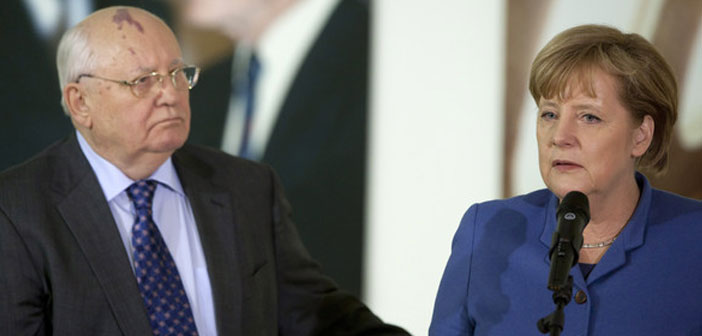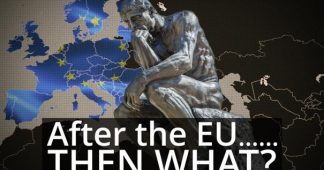(a triumph for the empire of Lloyd Blankfein)
By Dimitris Konstantakopoulos
First Published: 19.10.2011
SUMMARY: Greece is on the verge of revolt or revolution, at least if its government continues to refuse the early election that everybody in Greece is demanding now. The markets seem to be on the verge of launching an even stronger attack on Italy. There is military tension in the Eastern Mediterranean, increasing the probability of a military conflict involving two members of the EU, a candidate member and Israel. As for Berlin, the way it is handling the European crisis reveals the same pattern of strategic mistakes that contributed to its military defeats in World Wars I and II, the only difference being that in the 20th century we were engaged in military wars whereas now we are faced with all-out financial war.
Germany has a rare historic opportunity to re-establish itself as a normal power, transforming itself into the political and economic leader of all Europe against “the markets”, a worthy and democratic “hegemon” of the continent, investing its ambitions in a radically reformed European project of world significance. Instead of this, its policies are undermining the European project: they are fuelling intra-European political wars and conflicts over debt. Germany, yet again in its history, is falling prey to an extremely narrow, provincial species of nationalism, the same primitive nationalism that has ruined the German Volk in the past. Germans are risking their own “Waterloo”, for the third time in two centuries, a heavier defeat than the one they sustained in 1945. There is not much time left before the historic defeat of the European Idea, collapse of the EU and a global economic crisis worse than that of 1929, which will have catastrophic consequences for Europe, the world and Germany itself.
To adopt a more systemic approach, it is not difficult to discern in the ways the crisis is developing in the European Union – and in the world’s economic architecture – some of the characteristics that led to the rapid demise/self-destruction of the Soviet system and Soviet Union, an entity very different from, but in its way as “closed” as, the current monetarist and neoliberal European and global economic system. The way European leaders are handling the European crisis is strongly reminiscent of the way Gorbachev was acting when he destabilized vital functions of his system and its structures, without having any clear idea of what might replace them. Unlike the Chinese CP, Gorbachev promoted a massive borrowing of Western values, thus legitimizing them. Deploying them in his own internal political struggles, he destroyed the “enemy image” that was at the heart of his political system. This is what we are bearing witness to in Europe right now. The European regime derives its legitimation from the promise of “freedom, prosperity and democracy”. It will simply not survive the current endeavour to ensure more and more profits for the banks, in the process destroying whole communities for the purpose of repaying the mountain of debt it has accumulated.
In this paper we try to show how different financial, political, ideological, national and geopolitical factors are contributing to the current crisis of the EU. We propose a synthesis of two seemingly opposed interpretations: one that posits a financial crisis that is a manifesation of chaos, and another that detects in each successive stage of the crisis the advancing project of an “Empire of Finance”, shaping Europe and the world in accordance with its own interests and its world vision. We focus on German policy because Germany is now the only remaining nation of Europe that is trying to produce a policy for Europe. The only other real actor in Europe is Greece, because it has become the terrain for experimentation with the new economic and social order in Europe. But also because the Greek government, under the direct control of centres of international financial capital, behaves as a real “agent of chaos” in European affairs.
From 1914 and 1939 to 2012
We are at a defining moment in European and, in particular German, history. The same malevolent mechanisms that were witnessed in Europe before World Wars I and II are again in action, in financial not military terms this time (at least for now), but with the same catastrophic potential for European prosperity, democracy and civilization. Everything we have been able to achieve since 1945 is now at stake. As a result of the way the German leadership is handling the European crisis, Germany runs the very real risk of experiencing, finally, an economic, political, geopolitical, moral and strategic defeat comparable to the military defeat it suffered in 1945.
It is difficult for ordinary human intelligence to grasp the situation in all its complexity. Our way of thinking is often still based on the realities and certainties of the world as it was between 1945 and 2008. If we are looking for an analogy, a good one to cite would be how Europeans were completely taken aback by the eruption of World War I in 1914. They were thinking in terms of the Belle Epoque although already well advanced into the new era of wars and revolutions that was the first half of the 20th century. “We aren’t going to pay for the Greeks,” say the Germans, just as the French said, on not such a different occasion “We aren’t going to die for Danzig.” But the “assassination” of Greece may well have comparable consequences to the assassination of Archduke Ferdinand in Sarajevo, in 1914.
The debt crisis is rapidly destroying the political foundations not only of the existing EU, but also of any kind of European integration. A media war has been launched against Greece and other countries of the European periphery, the so called PIGS, reminding us of the psychological campaigns against “hostile” or “rogue” states such as Iraq or Serbia. Such campaigns in fact preceded military attacks against these countries. In much the same way, they preceded speculative attacks against Greece, rapidly transforming a member country of the eurozone into the financial equivalent of Iraq.
Two years further on, the EU summits are coming more and more to resemble gladiatorial contests, and becoming more and more ineffective. Relations between Germany, France, Britain and Italy are worse than they have ever been. The European Central Bank tries to exclude from the restructuring deal for Greek debt the debt it bought at a very low price in the secondary market – that is, from speculating against, and making money out of, a member country of the EU in a situation of distress! The common people in Germany say that they don’t want their hard-earned income to go to pay the debts for Greek crooks, unaware that Greeks work much more than Germans and that anyway German “assistance for Greece” money does not go to Greece but to the international megabanks, who are the real crooks. The Bulgarian Prime Minister says he is happy because Greek society is being destroyed, much as Bulgarian society was destroyed at the fall of communism. Greeks themselves are more and more accusing the Germans of behaving in exactly the same way as in World War II, i.e. looting and destroying their country. They refer increasingly to a 4th Reich and in many cases identify with EAM, the fabled National Liberation Front, the most important resistance movement in all of Europe, active between 1941 and 1944. What does this all mean? It means that less than two years after the eruption of the European sovereign debt crisis, the financial, political and ideological prerequisites for destruction of the whole European project are now in place. Global forces, and in particular the new “Empire of Finance”, interested as they are in dominating or destroying Europe, have new and important tools for accomplishment of their goals. Every European nation is blaming the other member states for the crisis; a crisis for which the world banks and completely unregulated world finance and economy are overwhelmingly to blame!
The German dilemma
For the first time in eighty years Germany now holds in its hands the key to the fate of Europe, its democracy and its civilization. But it will not be holding it for long and does not seem to know what to do with it. Germans have used “the markets” against Greece, employing them as a kind of “Maastricht police”, to punish Greeks and discipline other Europeans, without realizing the terrible price they are going to have to pay, as Faust did, for their pact with the devil. They tore Greece apart economically, just as Stalin and Hitler did with Poland in 1939. Germany is overestimating itself, relying too much on its economic power, in the same way that it overestimated and relied too much on its military power in the first half of the 20th century. Berlin thinks it can play with the markets, as Daladier, Chamberlain or Stalin thought they could play with and use Hitler.
Between 1939 and 1941 Hitler attacked all Europeans, trying to unite and discipline them prior to addressing his main concern: the conquest of Russia and the defeat of Bolshevism. But Hitler’s project reflected the essentially provincial, narrow and violent character of German nationalism. Germany has never understood its own great theoretician of War, the Prussian Carl von Clausewitz, who rightly saw behind the victories of Napoleon the force of the ideas of the great French Revolution. The more successful and stable hegemonies were those based on general ideas and also including a “carrot” for the nations under their dominion. That was the case with US hegemony, based on the vision of “an independent, free and successful individual”, and with the USSR, based on “socialism”, and with the EU, for as long as it was based on the common dream of “prosperity and freedom for all”.
Hitler failed to conquer Britain and he paid a high price for attacking Greece. He could have beaten the USSR, but when he finally attacked it in June 1941 he had already lost precious energy and time. In a way that would have left Sigmund Freud speechless, Angela Merkel is doing exactly the same. She is trying to punish Greece and discipline all Europeans before, on behalf of all of the EU, addressing the question of the markets. She runs the risk of destroying all of Germany’s political capital with the European Union.
The IMF’s and the markets’ “police”, invited, welcomed, aided and abetted by Germany, not only punished supposedly criminal Greece. They literally destroyed Greece and are now attacking one country after another in Europe and even the USA, proving that Greece is not an exception but an extreme case, enabling us to see and understand the fundamental mechanisms that are in action. For two years everybody has been trying to address the Greek problem, but the only result of these efforts has been an immense increase in this country’s debt and rapid and unprecedented destruction of its economy and society.
No solution inside the system
German and European politicians have been trying to find a solution, but everything that has been proposed and then agreed has failed in the following weeks or months, indicating that the problem is systemic, i.e. there is no solution within the given political and economic model, so-called “liberal globalization”, characterized by the accumulation of enormous economic and political power in the hands of the captains of finance and the total deregulation of financial and other markets, in practice of all financial, economic and trade activity around the globe. What is under way is the destruction of Europe and the precipitation of a world crisis worse than the one we suffered in 1929.
The financial monster created over the last 40 years, a world “Empire of Money”, is now destroying our states, nations and civilization. As long as the solutions being proposed ignore the main cause of the problem, the problem will persist, jeopardizing the very existence not only of the European Union, but of European civilization as a whole, its welfare state, its democracy, in short everything Europeans have been able to achieve since 1945. If we actually try to repay the mountain of debt accumulated by the banks and other financial institutions we will have to destroy our societies, transform European citizens into lifelong slaves, organize the social equivalent of new world wars, or see new military wars being launched on a scale even more massive than the ones in the Middle East over the past decade. And destroy even faster the natural environment of the planet, the very foundation of our existence.
History is confronting Germans with a dramatic strategic dilemma. They now have a really historic chance once more to become a “normal” nation, escaping the mental prison that was imposed on them after their defeat in the Second World War, and because of the way this defeat was handled by both Germans and their conquerors (1). Success would be predicated on Germany achieving leadership of the European nations in their effort to control the financial monster threatening European society, democracy and civilization. It would require that Germans take the lead in a really titanic, hugely difficult, but also absolutely necessary radical paradigm shift towards another economic model, if we really wish to save our continent from the totalitarian force of the so-called “markets”. We need to radically restructure the European debt, to ban or at a minimum strictly regulate credit default swaps and other derivatives, to replace a European economic model that generates debt with a model that generates production, moving towards keynesianism, some form of protectionism and regulation. We need a gigantic redistribution of income and wealth, to reverse the path we have been following for forty years. We need a European government, not governance, but such a government must be democratic and must also meet social, developmental and ecological goals, not just underwrite the value of money, as Maastricht does. We need a new New Deal and, in order to achieve it, a political leadership with the courage and skills of a Franklin Roosevelt, Winston Churchill or Charles de Gaulle, to address the present crisis and save Europe.
The other way for Berlin is to continue doing what it is doing, precipitate the destruction of the Union and alienate the majority of its nations, laying the foundations for the dominance of the “Empire of Money” on the whole continent, including finally Germany itself as one of the subject-states. Germany of course possesses important comparative advantages and will be able to survive longer without the other Europeans, but how, on its own, will it be able to stand up globally to China or India, in 20 years? What kind of “soft” (not only “economic”) power will it possess, after the terrible political and ideological fall-out from total destruction of Europe under its leadership? Such an outcome could in fact signify an economic, moral, political, and strategic defeat worse than the military defeat Germany suffered in 1945.
Empire against Germany
It was the first secretary of NATO, Lord Ismay, who defined the goal of the Atlantic Alliance in his famous formula: “To keep the Americans in, the Germans down, the Russians out”. The British Empire has delivered its mantle to the US Empire, the US Empire has kept its crown through an alliance of financial power and American weapons, the USSR has committed suicide, but the imperial know-how remains intact. The methods and the protagonists are changing but not the fundamental goals. Now it is probably not the Secretary General of NATO who is of greater importance, but the President of Goldman Sachs Lloyd Blankfein, who was once heard saying “I do the job of God”. (3)
Blankfein could not afford to make a mistake in 2008. He had everything well planned in advance, but he still could not be sure of the direction things might take. His man Paulson had literally to beg members of Congress to save the banks. Three years later, Lloyd Blankfein and his colleagues are no doubt laughing at the Germans and the Europeans. Merkel, Sarkozy, Obama, all of them humiliating themselves in their efforts to “calm the markets”. Not only were he and his colleagues able to conserve and expand their empire and its fantastic profits; not only were they able to pass their own losses on to the states, thus creating the sovereign debt crisis: they have now got to the point where they are able to regulate the size of state budgets, the level of social expenditure and investment in Europe and the US, even how many members the European Union should have or if it will continue to exist!
A Goldman Sachs’ man was appointed chief of the “European” Central Bank. Another, Otmar Issing, writes in the Financial Times Deutschland, essentially confronting Europeans with the dilemma of whether to put their Union under a dictatorship of “the Markets” or see it dissolve. This same Issing, who is regarded in Germany – heaven knows why – as the greatest of authorities on monetary policy, explained in another famous article in March 2010 why it would be wrong for Europe to help Greece. In this latter article he concealed his role as a paid advisor to Goldman Sachs. This is the bank that, while being employed to advise the Greek government, saw no conflict of interest between doing this and orchestrating, after September 2009, a speculative attack against Athens.
Financiers like Issing or Soros – the latter famed for the great financial attack he launched against British participation in the EMU, an early predecessor of the attack currently being launched against Europe by the empire of finance – are now the main people discussing in European newspapers the fate of the continent in which were created all the basic and vital ideas of modern times, in all spheres of life and knowledge. This is what has become of the Europe of Kant and Voltaire, Marx and Nietsche, Robespierre and Garibaldi, Sartre and Goethe, of the French Revolution, German romanticism, socialism. It is Soros, Issing, Goldman Sachs, or people like Barroso (!), who are discussing and deciding the fate of European civilisation. This is how it is going to be destroyed.
The City’s friendly advice to Germans or the imperial trap for Berlin
At the end of September the London Financial Times published an unusually blunt editorial urging the EU, the ECB, the IMF not to deliver the sixth tranche of the loan they had agreed to provide for Greece. The editorial explained that Greece had no international financial obligations to fulfill until the end of the year. Of course, if the tranche were not delivered, the Greek government would be unable to pay salaries and pensions, conceded the editorial of the newspaper, spokesman for City financiers. (In the weeks following the publication of this editorial, under the threat of a cut-off of financing, the Greek government was thrown into disarray. Its reactions betrayed panic: it embarked on a campaign of slaughter of all social classes in the country, under the close supervision of the EU-ECB-IMF troika that had been sent to Greece to assume the role of economic assassin.)
The British know Greeks and Germans much better than Greeks and Germans know themselves. They are familiar with their respective national characters. They have fought with both repeatedly and in various ways and brought them under their hegemony. The City financiers are in a very good position to predict the probable outcome if their advice is followed, as it is being followed. It will bring about the ruin of Greece, putting this country, and indeed Europe, in a much weaker position for confronting them. It will very probably also push the Greek people sooner or later into some kind of revolt, in the first instance against their government but after that against Germany and the EU. You can accuse Greeks of anything you like but the reality is that they made Europe’s second most important revolution after the French Revolution. They convened a constituent assembly in 1822 when Napoleon was already defeated and a “Holy Alliance” was ruling over Europe that banned any kind of revolt. They also. during the Second World War, organized, in per capita terms, the most massive resistance.
City financiers know also, very well, the German character: they know that Germans like discipline as much as Greeks like rebelling. They believe that Berlin will respond to a Greek revolt in a harsh, apolitical and inflexible way. Germany and the EU have, probably, the political and economic weight to provoke an even greater disaster for Greece, than the one they have already provoked with their policy, in cooperation with the Greek government. But what they don’t have are the means to escape the financial and, even more important, the terrible political, ideological and geopolitical fallout from destruction of a small, but at the same time the most historic, country in Europe. They can do it. They probably will do it. But they will precipitate their own doom. If Americans spoke about the “law of unintended consequences” after their adventures in the Middle East we will have to introduce into Europe a new “law of assymetrical results”.
The idea of political integration in Europe will receive a fatal blow for decades. Even now the political climate in Europe is becoming quite poisonous. Both “rich” and “poor” nations are beginning to protest against “helping” Greece, unaware that they are not helping Greeks in any way. What they are doing is helping the banks to destroy Greece, sometimes even speculating on the difficulties of a fellow member-country and profiting from this. Everybody in Europe is now beginning now to look to national solutions. In France, always the political barometer of the whole continent, the far right National Front of Marine Le Pen is now a respected political force. The fundamental political axioms, based on which the post-war prosperity, democracy and peace in Europe was created and endured, are now rapidly being undermined, in front of our very eyes.
When the catastrophe occurs, when the dust settles, every European nation will begin to accuse the other Europeans, and all of them will accuse the Greeks. German and other European leaders will no doubt blame Greeks for all the ills of Europe and use them as a pretext to impose draconian economic and social policies in Germany and Europe. Greeks, for their part, will be frustrated at having been rejected by Europe, the continent towards which they have been turned for two and a half centuries. They will turn not so much against “the markets”, which lack an address and telephone number, but against Europe,and Germany in particular. They will blame it for destroying their country for the second time in less than a century. They will remember that Germany did not pay any war reparations and did not even return the gold stolen from the Greek central bank. They will reopen the accounts of Siemens and other contracts, given the fact that European firms were paying massive bribes to Greek politicians. The International Herald Tribune, Time, or even the Financial Times will then publish very accurate reports of hunger in Athens or analyses of how impossible it has proven for Europeans to solve their own problems. The implications will be clear. First, the spectacle of Greek social disaster will be utilized to terrorize all European citizens into accepting the salaries and pensions that their governments will be allowed by the banks to give them. Secondly, everybody outside Germany will come to the same conclusion: “Germans have not changed. They are still the same. We can’ trust them.”
This is precisely the psychological and ideological mechanism used by the Empire to acquire dominion after the war against Germany and Europe and keep the continent divided and dependent, notwithstanding its very important economic, social and intellectual achievements. And it will be a great irony of history that German nationalism will, once again, have contributed to the ruin of German national interests.
Let us remember what happened in 1956. The Soviet Union still enjoyed tremendous prestige in Europe, due to its role in the defeat of Hitler. Nikita Khrushchev was trying to reform the country internally, to free it from its terrible Stalinist legacy. When revolution appeared imminent in Hungary, some forces encouraged Budapest to revolt, assuring the insurgents that they would have western backing. The Hungarians quit the Warsaw Pact. It was more than Moscow could afford to tolerate. Soviet tanks smashed not only the Hungarians but also Soviet prestige in Europe, the Western European Communist movement and the chances of successful reform in the Soviet Union itself. The foundations of Soviet dissolution, decades later, had already been laid. As events were unfolding in Central Europe, Israel, we might note in passing, found an opportunity to unleash another of its wars in the Middle East.
Now put European Union in the place of the Soviet Union, Germany in the place of Russia, Greece in the place of Hungary, credit default swaps in the place of tanks, and you have a probable scenario for the immediate future. There is also a great deal of movement, and more is to be expected, as in 1956, in the Middle East, but our attention will be distracted from it by Europe’s debt wars. This, by the way, is the classic method used by powers outside Europe for dominating the nations of Europe in the 20th century, i.e. by getting Europeans to fight among themselves. In the previous century it was by military means. Now it is financial.
The markets “ultimatum” to Europe: submit or dissolve
The markets’ strategy towards Europe is an important subject which space constraints preclude us from analyzing in depth here. The fact is that we tend to look upon the markets as quasi-automatic mechanisms of capital accumulation. We tend to see the banks and other financial institutions as mere profit-seeking institutions. They are not. We should not confuse the quasi-automatic functioning of the markets with something quite different: the ability of a highly concentrated group of capital holders to orchestrate and catalyze market events. We should not forget that the ten biggest banks in the world are able to mobilize capital equal to the debts of all the countries in the world. They have the same financial power as all nations put together!
Private financial institutions are strategic actors. They represent the greatest concentration of financial power and international political influence the world has ever known. They were even able, through derivatives, partially to hijack the key function of states: issuance of money. Their level of strategic planning is the level required for empires. Our states and politicians do not have anything even remotely comparable, without even taking into account their own dependence on money owners. The only weakness of this “state behind the states” is that it lacks political legitimacy and military force: it is obliged to rely primarily on the US armed forces and military-industrial complex. These players are radical in their thought: it is we who are the conservatives. They manage the radical changes in the system, in the direction they want; we try to manage a more and more unmanageable existing system. They tend to look at the long-term, we do not look beyond management of day-to-day affairs, preparing for the next municipal or national elections. They see the big picture; we see the small. This is why they are winning.
In the geopolitical sphere, the Wolfowitz and Jeremiah reports, which shaped the post-cold-war strategy of the USA and established the foundation for the subsequent wars in the Middle East, constitute a very useful example of the imperial outlook, a model which can also help us understand how these “Leninists of the markets” think and act. The financial attack against Greece followed the same strategic logic as the military attack against Iraq: it is the cornerstone, the overture for radical reshaping of the world.
What the two reports essentially explain is that the Empire must not wait for threats to its dominion to appear or be activated, that there is a need for a proactive strategy, aimed at precluding preemptively the emergence of poles of power with the capacity to challenge American global domination. If the European Union becomes a political entity in its own right it will pose an obvious threat to the geopolitical monopoly of the Empire. If the euro establishes itself as the world’s reserve currency, it will undermine one of the pillars of US domination, weakening the prospects for future financing of the US economy.
On the subject of the economy, the markets know better than anyone else that a second, worse, financial tsunami is on the way. Rather than trying to stop it, they obviously hope to divert it into channels profitable to themselves. They are even obliged to do this, because otherwise, as they rightly fear, some politician may appear who will blame banks and markets for the crisis and demand that they pay a considerable part of the debt., in preference to demolishing the whole European postwar edifice in an attempt to repay it themselves. They also know that times of upheaval present great opportunities to shape developments for decades to come. If they don’t turn them to their own advantage, they could suffer serious, even fatal, losses. The present crisis is, from their perspective, a huge historic opportunity to demolish the European welfare state and probably European democracy along with it, transforming European workers into slaves who will be working all their lives to pay off accumulated debt.
The markets can afford an EU that works in strict accordance with the requirements of the Maastricht monetary monster, in the process becoming a protagonist for their own programme. What they cannot afford is the transformation of the EU into any kind of state power with the ability to bring them under control. If the EU can transform itself successfully into an instrument of Empire, they will probably avail themselves of it. If not, they will take advantage of the environment of chaotic decomposition of the euro and the EU to forge ahead with their own abovementioned political, economic and social goals.
In a revealing recent article, the Wall Street Journal could not resist the temptation of expressing its enormous enthusiasm for the direction the European crisis was taking. Firstly, it said, this crisis has dealt a fatal blow to the dangerous dream of a “European super-nation”. Secondly, the euro has played its role in triggering the crisis. Thirdly, as the Wall Street Journal insisted, the coming crisis represented a truly historic chance to destroy the social state on the continent and in the US.
The markets hate modern social humanism, they hate strong states in general and the Germans in particular. Ancient Athens saw the first restructuring of debt by Solon, leading to the first experiment in Democracy. The theoretician of ancient democracy Protagoras captured the essence of this democracy when he said that “man is the measure of all money”. For the civilization of finance the reverse applies. “Money is the measure of all men” or, more simply, markets regulate everything.
The coming Greek revolt
The programme being applied now in Greece by the EU, the ECB, the IMF and a “Greek government” that finds itself on better terms with the Rothschild family than it does with the Greek people does not leave Greeks with many options other than revolt, even excluding the factor of sly incitement through Financial Times editorials. The ongoing programme is tantamount to economic and social genocide. It has already destroyed the foundations of parliamentary democracy in this country. With European and international “assistance” the Greek economy has been pushed into free fall, at a rate higher than that in the Weimar Republic prior to Hitler’s coming to power. Every single social class, including the middle classes, is being ruined, with the exception of very thin layers of the super rich. The social structure is undergoing rapid transformation towards the typical Latin American model. Average living standards and available income are on a downward reduction spiral, currently at 50% and without any perspective of stabilization. Social security and health care have been destroyed. The state is undergoing meltdown. The historical irony, if this is the right term, is that the “cure” being applied in Greece reserves special punishment for the most productive, hard working and honest of its citizens, thus destroying any prospects of a national renaissance. Most of the young, more talented and better educated and dynamic people in the country dream of emigrating. The morale of the Greek nation is now at its worst level since the first terrible winter of the German occupation, in 1941-42, before the emergence of the enormous resistance movement, the largest in Europe during the Second World War in per capita demographic terms. In the big urban centres Greeks are already experiencing not just poverty but incipient famine. As if this were not enough, various international agencies evidently have their eyes on the totality of the property of the Greek state as realty for defraying part of the costs of debt repayment. In some cases they will even present themselves as the builders of a new Greek nation state, in much the same way that the ex-Soviet republics and Russia were looted during the years of transition to nothing and shock without therapy.
The forces which have planned the destruction of Greece and are now implementing it probably prefer that the country implode rather than explode. The Germans in particular seem to have this expectation and in any case never understood the “rationalitiy in irrationality” of revolts and revolutions and probably think that Greeks will accept passively the ruination of their life conditions, as occurred in Eastern Europe. Such a scenario cannot be excluded but seems implausible. Greek political traditions are very different from those of Eastern Europeans. For a start, there is no Communism to blame for everything. There is of course a massively corrupt political class and state elite. They were corrupt on their own account, but they were also on the payroll of big European firms like Siemens, which in exchange for the bribes they distributed for decades exploited the Greek market, sometimes literally looting the Greek state and budget.
The rapid destruction of all national conceptions and social bonds that is now under way in Greece as a result of the European and IMF programme is engendering a terrible force that is straining to find expression. The Empire is well aware of this. Rather than see a social explosion in Greece, they would prefer to see the energy channeled in other directions. Leaving aside implosion or explosion, two other possible directions suggest themselves. One is confrontation between Greeks and immigrants. 80-90% of the emigration flows into Europe attempt to use Greece as a transit gate to Europe but stay finally in Greece, exerting a disintegrative influence on social structures that are already problematic. The second possibility is in the direction of low-intensity warfare, nationalism and fascism.
Mars meets Venus
Greece is not just the epicentre of the debt crisis. It is a fractal of all the possible crises with the potential to threaten Europe. Greece and Cyprus, unfortunately for their people, are located in one of the more important geostrategic points in the world, controlling Russia’s access of Russia to the “warm seas”, France and Germany’s access to the energy of the Middle East, Israel’s access to the Western world. They are at the crossroads between the Middle Eastern “world of Mars”, the Slavic world, in temporary retreat and decline, and the European “world of Venus”. Cyprus seems to posses important energy reserves. If anywhere, it is in this region of the world that the explosive dynamics of “geopolitical revisionism” can be combined with action in the Middle East, especially over the last decade, and with “market revisionism”, as part of an endeavour at fundamental reshaping of the state of affairs established in Europe after World War II, for the benefit of those who would like to dispense with social compromise.
For the time being the debt wars in Europe and the military conflicts in the Middle East are on separate trajectories. Both are explosive and what might happen if they combine?
Does the European Union have even the remotest capacity to handle simultaneously its debt crisis and a geopolitical crisis, or does it risk being destroyed before anybody understands what is happening? Look at the map of the region. What do you see? A situation of unprecedented instability after 1989-91. Five countries that are coping with very different but very deep crises (Syria, Libya, Egypt, Cyprus, Greece). And, between Cyprus and Syria, an unprecedented concentration of US, Israeli and Turkish forces, to which a Russian flotilla will be added by the end of November. Greek, British and French ships are also present.
Exercising its indisputable right, the Republic of Cyprus, in co-operation with Israel and Noble Energy, has begun exploratory drilling for gas in its Exclusive Economic Zone. Turkey does not like this at all and has sent a naval flotilla to the region. The conflict risks re-igniting a vast array of Greek-Turkish differences. Israel, which wishes to find an opportunity to include Cyprus in a wider sphere of influence in the region, is proposing its own defense umbrella for Cyprus. Israeli aircraft are now faced off against the Turkish navy in the region. In November Greek aircraft will be engaged in joint exercises with the Israeli air force. At the end of November a Russian flotilla will be added to this mix. Objectively speaking what we see is the deployment of a mechanism which can be used by various players with different potential regional or global agendas to trigger a “limited military conflict” even as early as next month.
Greece was utilized by the “Empire of the Finance” to launch the attack against all of Europe, to bring the IMF into Europe’s internal affairs and to act as a laboratory for the most extreme forms of neoliberal politics to be applied in Europe. It has the potential to be used for the destruction of the EU and also as experimental terrain for the re-imposition of authoritarian regimes in Europe. The Greek nation, citizens of Greece and Cyprus, are in a situation approaching that of Poland in 1939, between Germany and Russia. Now Greeks risk being torn apart economically, between Germany and “the markets”, geopolitically between Israel and Turkey.
We cannot be sure what is going to happen next, and when. The worst case scenario, a “limited military conflict” in the Mediterranean, could serve the purpose of:
Α. deflecting the enormous forces unleashed by the destruction of Greek society against an external enemy, not against the Greek political elite, in this way legitimizing an authoritarian regime in Greece
B. incorporating Cyprus and Greece more decisively into an upgraded Israeli sphere of influence, along with Bulgaria, Romania and other larger members of EU, especially if Greece is thrown out of the EU or if the EU is dissolved. Such events will completely annihilate any German or European strategic influence in South Eastern Europe and the Eastern Mediterranean and would constitute a geopolitical defeat of strategic proportions
C. establishing yet another mechanism for “crisis provocation” inside the EU, and one not controlled by any European power
Athens, 19.10.2011
Konstantakopouos.blogspot.com
konstantakopoulosd@yahoo.gr
NOTES
1. The world’s two most educated nations, Germany and Israel, came out of the Second World War with a terrible trauma, which still holds them hostage to their past and now risks repeating itself in other ways. In the case of the Germans, this is the result of a conscious effort by the victors of the war to make Germany incapable of again becoming in any way the maker of its own history. Both nations are still not able really to escape the victim/victor dichotomy. In a broader context the fate of our civilization greatly depends on these two states not “negating” their past but escaping it by becoming normal nations.
It is true that the Hitler regime committed terrible mass crimes. But the unspoken implication of the dominant interpretation of the 20th century, that the Germans are inherently bad, and/or that Jews, victims of a terrible genocide, are a “unique” people, for whom special rights must be recognized, is the way not to overcome the past, but to repeat its legacy in other ways. Only if Germans and Israelis find the courage to rethink their history in rational terms and stop considering themselves unique or special will they be able really to metabolize their history.
Germans have been treated as fundamentally “bad guys”, something which does not free them from domineering or revanchist tendencies. Such tendencies are not characteristic of Germans in particular but are to be found in virtually all nations. They are features of human nature, not German nature. By putting Germans in the position of the eternally guilty party, the victors of the war drove these tendencies deeper into the psyche of this nation, from where they will – if they remain suppressed – always try to escape and find expression, given a plausible pretext.
Human beings tend to punish others for the treatment they have received as children from their own environment. What Germany is now doing to Greece is very similar to what the victors of World War I did to Germany through the Versailles Treaty. What Israelis do to Palestinians is the symbolic reflection of what Nazis did to them. I remember being shocked to read the word “Achtung” at the Israeli check point when crossing the line into the occupied territories. I was travelling to Ramalia and no German-speaking people worth mentioning travel to this area.
There can be no underestimating the horror of Hitler’s mass crimes, but we should admit that Germans were not alone in making the 20th century what it was. Verdun preceded, and contributed to, even if it did not directly cause, Dachau and the Gulag. It was not the other way around. We can talk forever about the impact of Romanticism, Nietsche or Wagner on German history, but the historic truth is that without the Treaty of Versailles there would be probably have been no Hitler. The crimes of the Hitler regime were atrocious, but it is wrong to conclude, as often implied, that the German people were responsible for all the evils and crimes of the 20th century. The levelling of German cities at the end of the War was an equally atrocious crime, serving no military purpose, but evidently aimed at destroying the German nation as such. The annihilation of Nagasaki and Hiroshima is another example of mass murder. There was no reason for overburdening the Germans with guilt after the War other than to hide the responsibilities of the other powers and to impede the German nation from regaining its status as a sovereign country. This is why the nation that produced Hegel and Marx, Clausewitz and Haushofer, seems unwilling or unable to formulate even the most rudimentary historical, strategic or geopolitical project. This is also why German nationalism remains at such a primitive stage, not even perceiving that it is being used against German interests.
2. This phrase of Lloyd Blankfein is cited by Mark Roche, correspondent for Le Monde in London and author of “The Bank”











